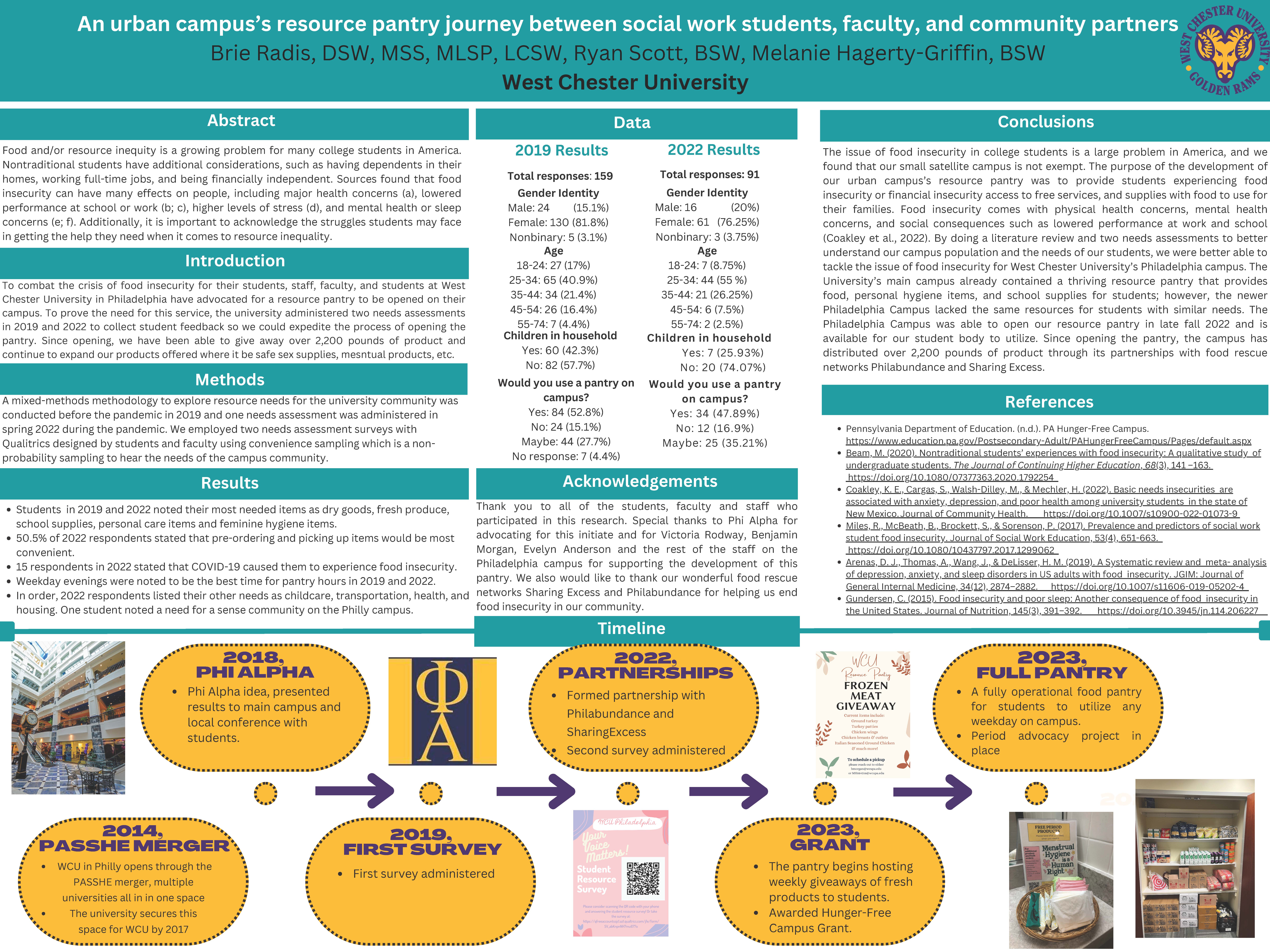An Urban Campus’s Resource Pantry Journey between Social Work Students, Faculty, and Community Partners
Brie Radis, West Chester University, West Chester, PA (USA)
Melanie Hagerty-Griffin, West Chester University, West Chester, PA (USA)
Ryan Scott, West Chester University, West Chester, PA (USA)
Food and/or resource insecurity is a growing problem for many undergraduate and graduate students. Food insecurity can have many effects on people, including major health concerns, lowered performance at school or work, higher levels of stress, and mental health or sleep concerns. This presentation will focus on the steps one campus took as a team of students, faculty, staff, and community partners worked together to create a fully functioning resource pantry on an urban campus.
Presentation Description:
The goals for this presentation will be to share the data and also the journey to establish the resource pantry for others who are curious about learning more about resource insecurity. Although there has been more focus brought to the issue of food insecurity on college campuses in recent years, there is still not enough being done to support students who are on campuses that do not have resource pantries. This need is further exacerbated when we look at student population trends nationwide and see that non-traditional students make up most of the general student population. This is especially significant as non-traditional students typically face even more barriers in the path to college completion compared to that of their traditional student cohort. On the issue of food insecurity alone, we see non-traditional students are even more likely to be food insecure and as a result oftentimes have lower GPA’s, lower rates of course completion and have more withdraws from classes than their traditional aged classmates. In order to help combat food insecurity for our students, our campus has come together to develop a resource pantry to address this significant need. On this campus prior to this addition we also been working to increase student engagement on an urban campus consisting of adult learners using monthly workshops and events used to support students both academically and socially whether it be APA workshops, to happy hour events on the weekends for students to catch up. In doing so, we’ve helped build an even stronger community where students have been coming on campus even more and are feeling more supported overall. Further, this project has pushed for collaboration among students, community partners like Sharing Excess and Philabundance and campus staff/faculty as we are all working collaboratively to help make our university become the most supportive learning environment it can be for our students.
References:
- Arenas, D. J., Thomas, A., Wang, J., & DeLisser, H. M. (2019). A Systematic Review and Meta- Analysis of Depression, Anxiety, and Sleep Disorders in US Adults with Food Insecurity. JGIM: Journal of General Internal Medicine, 34(12), 2874–2882. https://doi.org/10.1007/s11606-019-05202-4
- Broton, K. M., & Goldrick-Rab, S. (2018). Going without: An exploration of food and housing insecurity among undergraduates. Educational Researcher, 47(2), 121-133.
- Burke, M. P., Martini, L. H., Çayır, E., Hartline-Grafton, H. L., & Meade, R. L. (2016). Severity of Household Food Insecurity Is Positively Associated with Mental Disorders among Children and Adolescents in the United States. Journal of Nutrition, 146(10), 2019–2026. https://doi.org/10.3945/jn.116.232298
- Daugherty, J. B., Birnbaum, M & Clark A (2019) ‘Having Enough’: Students’ Understanding of Food Insecurity and Campus Food Pantry Use, Journal of Poverty, 23:7, 600-620, DOI: 10.1080/10875549.2019.1652721
- Ellis, T. J. (2022). " A Lot of Us Struggle with Food": Investigating the Communicative, Intersectional, and Systemic Nature of College Food Insecurity (Doctoral dissertation, University of Alabama Libraries).
- Ellison, B., Bruening, M., Hruschka, D. J., Nikolaus, C. J., van Woerden, I., Rabbitt, M. P., & Nickols-Richardson, S. M. (2021). Food insecurity among college students: A case for consistent and comparable measurement. Food Policy, 101, 102031.
- Freudenberg, N., Goldrick-Rab, S., & Poppendieck, J. (2019). College Students and SNAP: The New Face of Food Insecurity in the United States. American journal of public health, 109(12), 1652–1658. https://doi.org/10.2105/AJPH.2019.305332
- Gilardi, S., & Guglielmetti, C. (2011). University Life of Non-Traditional Students: Engagement Styles and Impact on Attrition. Journal of Higher Education, 82(1), 33–53. https://doi.org/10.1080/00221546.2011.11779084
- Gundersen, C. (2015). Food Insecurity and Poor Sleep: Another Consequence of Food Insecurity in the United States. Journal of Nutrition, 145(3), 391–392.https://doi.org/10.3945/jn.114.206227
- Goldrick-Rab, S., Clark, K., Baker-Smith, C., & Witherspoon, C. (2021). Supporting the whole community college student: The impact of nudging for basic needs security. The Hope Center for College, Community, and Justice.
- Hunger free campus bill - student basic needs policies. Swipe Out Hunger. (2022, September 15). Retrieved November 20, 2022, from https://www.swipehunger.org/hungerfree/
- Laska, M. N., Lenk, K., Lust, K., McGuire, C. M., Porta, C. M., & Stebleton, M. (2020, December 29). Sociodemographic and health disparities among students screening positive for food insecurity: Findings from a Large College Health Surveillance System. Preventive Medicine Reports. Retrieved October 10, 2022, from https://www.sciencedirect.com/science/article/pii/S2211335520302552
- Mason, D. J. (2020). Food Insecurity and a Threatened Safety Net. JAMA: Journal of the American Medical Association, 323(5), 406–407. https://doi.org/10.1001/jama.2019.22150
- Meza, A., Altman, E., Martinez, S., & Leung, C. W. (2019). "It's a Feeling That One Is Not Worth Food": A Qualitative Study Exploring the Psychosocial Experience and Academic Consequences of Food Insecurity Among College Students. Journal of the Academy of Nutrition and Dietetics, 119(10), 1713–1721.e1. https://doi.org/10.1016/j.jand.2018.09.006

